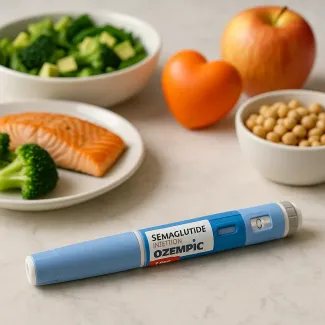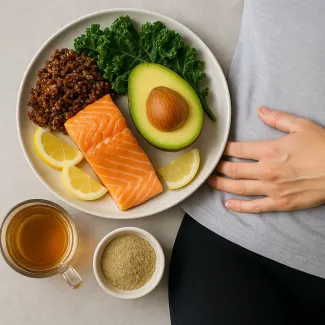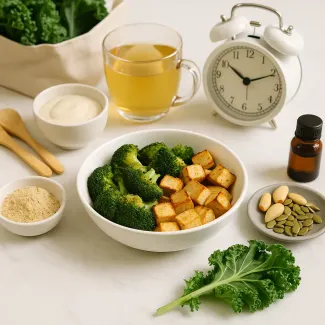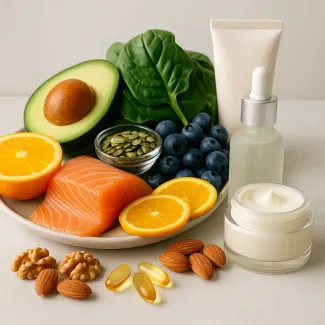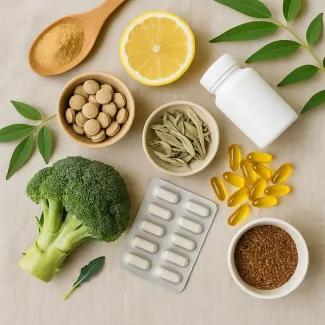
Discover Natural Ways to Ease Hormonal Changes After 30
Gentle lifestyle shifts and plant-based solutions for hormone harmony
Living with PMS (premenstrual syndrome) or navigating the challenges of menopause can feel overwhelming—but it doesn’t have to. For many women, the physical and emotional symptoms tied to these hormonal phases are disruptive. The good news is that more women are turning to natural remedies that support their bodies without synthetic hormones or harsh medications. In this guide, we’ll explore how to soothe PMS and menopause naturally, improve your daily well-being, and regain hormonal balance in your 30s, 40s, and beyond.
Understanding the hormonal rollercoaster: PMS vs. menopause
What causes PMS symptoms?
PMS symptoms typically arise during the luteal phase of the menstrual cycle, a time when progesterone levels fluctuate. For many, this imbalance leads to mood swings, irritability, bloating, breast tenderness, cravings, and fatigue. The underlying issue? A sensitivity to hormonal shifts that affect neurotransmitters, especially serotonin and GABA.
What happens during menopause?
Menopause marks the permanent end of menstruation, but it doesn’t happen overnight. It’s preceded by perimenopause, a transition phase where estrogen and progesterone decline irregularly, causing hot flashes, night sweats, brain fog, vaginal dryness, and sleep disruptions. These symptoms can last for several years, often intensifying if not addressed early.
Herbal allies: Nature’s support for hormonal balance
Chasteberry (Vitex agnus-castus)
One of the most popular natural options for PMS relief, chasteberry influences the pituitary gland to increase progesterone production. This helps with cycle regulation and reduces symptoms like breast tenderness, irritability, and acne.
Black cohosh
Often used during perimenopause and menopause, black cohosh may reduce hot flashes, night sweats, and mood swings by interacting with estrogen receptors in the body.
Dong quai
Dubbed the "female ginseng," this traditional Chinese herb is used to relieve menstrual cramps, support blood flow, and ease menopausal symptoms, especially when combined with other herbs like peony or licorice root.
Maca root
A Peruvian root rich in adaptogens, maca helps the body adjust to stress, supports energy levels, and may stabilize mood and libido during both PMS and menopause.
Nutrition matters: Foods that support hormonal well-being
Cruciferous vegetables
Broccoli, cauliflower, kale, and Brussels sprouts contain indole-3-carbinol, a compound that supports estrogen detoxification in the liver. Eating these regularly may reduce estrogen dominance, which is a common issue in both PMS and perimenopause.
Omega-3 fatty acids
Found in fatty fish, chia seeds, and flaxseeds, omega-3s reduce inflammation and promote brain function and emotional stability, key for women struggling with mood swings or brain fog.
Fermented foods
Sauerkraut, kimchi, kefir, and plain yogurt support the gut microbiome, which plays a direct role in hormone regulation and neurotransmitter production, including serotonin.
Magnesium-rich foods
Magnesium supports muscle relaxation, reduces menstrual cramps, and improves sleep quality. Include foods like pumpkin seeds, almonds, spinach, and dark chocolate in your diet regularly.
Hormonal imbalance signs you shouldn't ignore
- Irregular cycles
- Sudden weight gain, especially around the abdomen
- Unexplained fatigue
- Persistent mood changes
- Low libido
- Insomnia or frequent wake-ups
If several of these symptoms persist, your body may be out of hormonal sync, and gentle interventions can help bring it back to balance.
Gentle exercise to regulate hormones
Walking
A daily 30-minute walk improves blood circulation, reduces cortisol levels, and supports estrogen metabolism. It’s also a great mood booster.
Yoga
Restorative yoga, especially postures that open the hips and stimulate the endocrine system, can alleviate PMS cramps, reduce hot flashes, and calm the nervous system.
Strength training
Muscle mass declines with age, especially post-40. Light strength training helps maintain insulin sensitivity, improves metabolism, and supports hormonal resilience.
Sleep: the underestimated hormone stabilizer
Hormonal health is deeply connected to circadian rhythms. Estrogen and melatonin interact to regulate sleep cycles. Women in menopause often report trouble falling or staying asleep, which worsens fatigue, brain fog, and mood changes.
Sleep support tips:
- Stick to a consistent bedtime
- Avoid blue light exposure 2 hours before sleep
- Use magnesium lotion or Epsom salt baths in the evening
- Consider natural melatonin enhancers like tart cherry juice or glycine
Emotional health during hormonal transitions
Mindfulness and stress management
Chronic stress raises cortisol, which disrupts progesterone production and increases inflammation. Practices like deep breathing, journaling, or guided meditation can restore calm and enhance hormonal communication in the brain.
Adaptogenic herbs
Adaptogens like ashwagandha, rhodiola, and holy basil help the body adapt to both physical and emotional stress. These herbs support the adrenal glands, which are crucial during perimenopause and menopause, when ovarian hormone production wanes.
Supplements that support hormone health
Vitamin B6
Essential for serotonin production, B6 can reduce PMS-related irritability and mood swings. It also supports progesterone synthesis.
Vitamin D3
Low levels are linked to menstrual irregularities, fatigue, and depression. Sun exposure or supplementation helps stabilize estrogen and calcium metabolism.
Calcium and magnesium
Combined, these minerals reduce menstrual cramps, support bone density, and improve sleep.
Evening primrose oil
Rich in gamma-linolenic acid (GLA), this oil supports hormone production, eases breast tenderness, and can improve skin elasticity during menopause.
Top lifestyle strategies for hormone harmony
Reduce caffeine and alcohol
Both substances can aggravate hot flashes, disrupt sleep, and contribute to mood instability. Reducing intake supports a more stable endocrine system.
Balance blood sugar
Unstable blood sugar causes insulin spikes, which disrupt hormonal feedback loops. Aim for meals with protein, fiber, and healthy fats to maintain energy and reduce PMS cravings.
Stay hydrated
Hormonal shifts can cause fluid retention and dryness. Drinking enough water supports lymphatic detox, cognitive clarity, and skin hydration.
Tailoring support by decade
In your 30s
Focus on cycle tracking, stress reduction, and supporting ovulation. PMS may become more intense with age, so early nutritional support is key.
In your 40s
As perimenopause begins, hormonal fluctuations intensify. Add adaptogens, prioritize sleep, and consider phytoestrogens from foods like soy, flaxseed, and red clover.
In your 50s and beyond
Support the body through the menopausal transition with calcium, D3, and collagen-rich foods. Manage weight and energy with strength training, protein intake, and thyroid support.
Common concerns and what to try
I can’t sleep through the night
Try magnesium bisglycinate before bed, reduce evening screen time, and sip lemon balm tea after dinner.
My hot flashes are embarrassing
Wear breathable natural fibers, keep a portable fan in your bag, and try sage supplements, which have shown benefit in reducing vasomotor symptoms.
I’m gaining weight around my belly
Look into cortisol balance, thyroid function, and introduce resistance workouts with a focus on protein timing (especially within 30 mins after exercise).
Natural ways to support estrogen detox
The liver is your hormonal filter. To support estrogen clearance, eat foods rich in sulforaphane (like broccoli sprouts), take milk thistle, and avoid xenoestrogens from plastic containers or chemical-laden cosmetics.
Reconnecting with your body during hormonal change
Sometimes the best remedy is simply slowing down and learning to listen to your body. Each symptom is a message, and with the right natural tools, you can begin to feel centered, energized, and yourself again.
